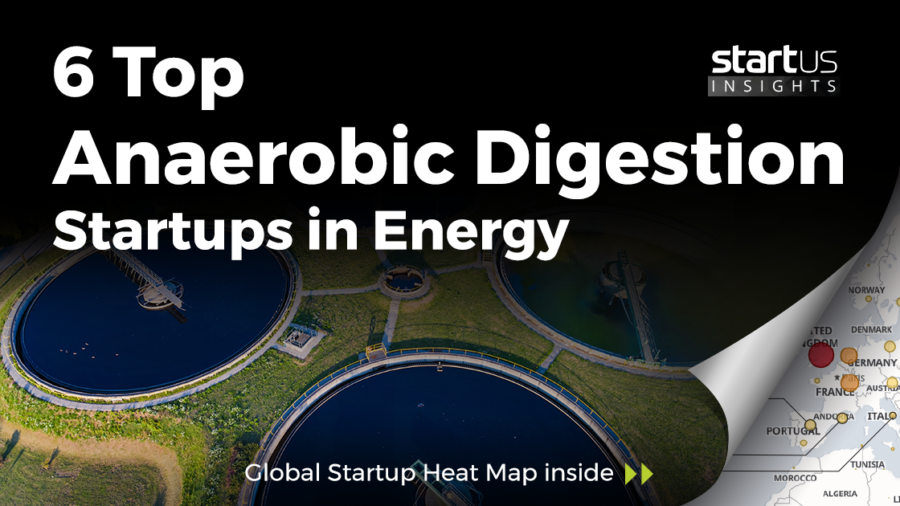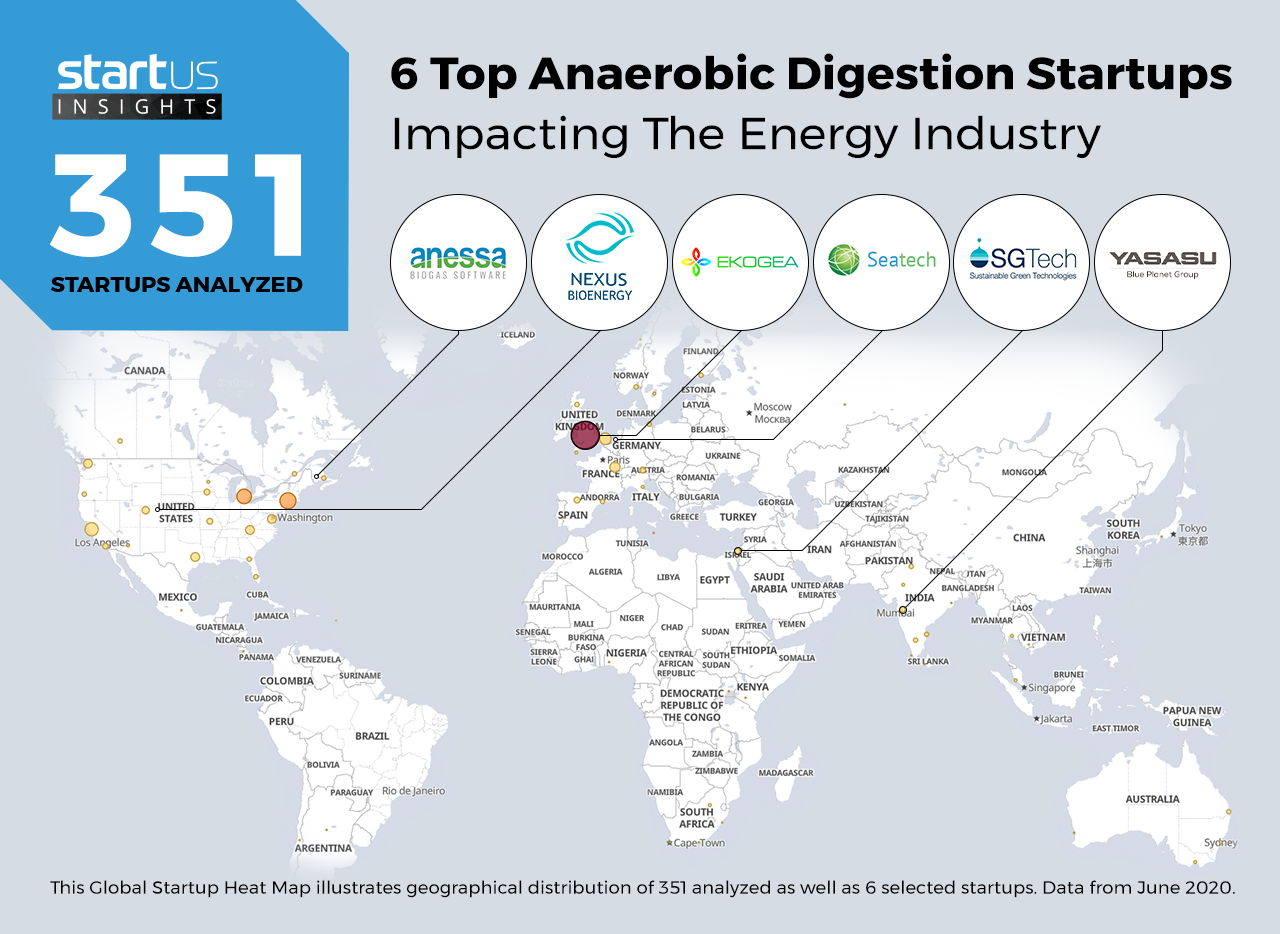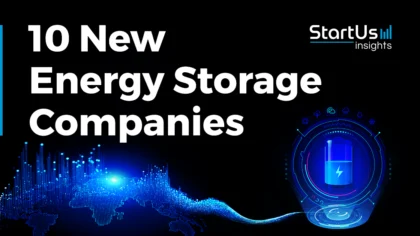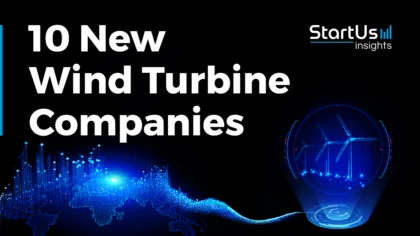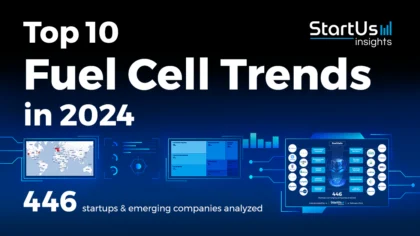Our Innovation Analysts recently looked into emerging technologies and up-and-coming startups working on solutions for the energy sector. As there is a large number of startups working on a wide variety of solutions, we want to share our insights with you. This time, we are taking a look at 6 promising anaerobic digestion startups.
Heat Map: 6 Top Anaerobic Digestion Startups
Using our StartUs Insights Platform, covering 1.116.000+ startups & emerging companies, we looked at innovation in the field of waste-to-energy. For this research, we identified 351 relevant solutions and picked 6 to showcase below. These companies were chosen based on a data-driven startup scouting approach, taking into account factors such as location, founding year, and technology among others. Depending on your specific criteria, the top picks might look entirely different.
The Global Startup Heat Map below highlights 6 startups & emerging companies developing innovative anaerobic digestion solutions. Moreover, the Heat Map reveals regions that observe a high startup activity and illustrates the geographic distribution of all 351 companies we analyzed for this specific topic.
EKOGEA – Prebiotic Microbial Enhancement
Advancements in renewable energy technologies have caught the gaze of policymakers all around the world. Emerging companies are looking beyond solar and wind energy at other viable sources, such as waste-to-energy conversion. Sewage and waste treatment provide opportunities for generating energy using anaerobic digestion, where naturally occurring microbes break down organic waste to create a range of byproducts for fuel, heat, and fertilizers.
British startup EKOGEA develops an anaerobic digestion process where it feeds and protects microbes to speed up the metabolic digestion process. In the pre-treatment stage, waste is broken down, separated, and doused with nutrients. Next, the startup uses a proprietary additive, BioComplex (BCx), that rapidly builds a diverse anaerobic microbial population. Moreover, they house the waste in proprietary bio media, holding the microbes in a fixed-film. This self-cleaning biomedia is unlike conventional digesters that lose important microbes with every digestate release.
Seatech – Anaerobic Sequential Up-Flow Reactor (ASUR)
The main byproducts of anaerobic digestion are methane, carbon dioxide, water, and a residual slurry called digestate. Advancements in anaerobic technologies allow companies to generate electricity by burning methane or converting water to steam to power turbines. The creation of this biogas is what makes it a promising solution as an alternative energy source. The use of biogas directly as a fuel, in combined heat and power systems and biomethane, displays natural gas qualities.
Seatech is a Dutch startup that designs and develops patented anaerobic digestion technology that separates the four stages of anaerobic digestion: hydrolysis, acidogenesis, acetogenesis, and methanogenesis. This enables the startup to control the operating conditions such as temperature, PH, and organic load, at every stage. This ASUR technology uses the produced biogas to control the volume of solids held in suspension. This way, the company is able to monitor the retention time for solids and liquids separately.
SG Tech – Integrated Ecosystem Solution (IES)
Digestate is a nutrient-rich residue that provides fertilizers for farming, and the final residual solids provide livestock with bedding and support structures. This generates an additional stream of revenue for waste processing and waste-to-energy companies. To make use of this potential, startups aim to maximize the various products arising from anaerobic digestion, making it a viable source of renewable energy.
Israeli startup SG Tech develops an integrated ecosystem solution to enhance nutrient recovery and biogas from anaerobic digestion. This process reduces the treatment time, extracts nutrient-rich digestate, and releases water that is suitable for irrigation. Moreover, the IES uses an algorithmic approach to organic waste digestion that results in higher methane concentrations, safe solid fertilizer, and clean water, while significantly reducing nitrogen and phosphorus contents in the treatment’s effluents.
Yasasu GREEN – High Solid Thermophilic Biomethanation
Advancements in anaerobic digestion and its potential benefits in energy production leads emerging companies to identify significant ways to improve the process. Feedstocks for producing biogas, for example, have greatly expanded from using animal waste as fertilizer to employing a wide range of digestible feedstock. This includes food and drink waste, processing residues, agricultural residues, crops, and sewage sludge. Additionally, this gives rise to the development of numerous ways of converting waste-to-energy.
Indian startup Yasasu GREEN develops its eponymous small-scale containerized product to treat waste at its source based on DRYCO-AD technology. This advanced biological process utilizes high solid thermophilic biomethanation for processing municipal solid waste. Moreover, the process is designed for high solids and is an effective and environmentally-friendly method for mixing and designing anaerobic digestion reactors.
Nexus Bioenergy – Membrane Hydrolysis Reactor (MHR)
Another key reason for the gaining popularity of anaerobic digestion is the flexible design and types of digesters available. The various digesters include flexible or rigid seal as well as plug flow digesters. Additionally, different mechanisms for mixing gases, and small-scale systems are also suitable for low energy requirement regions. Depending on the waste material that needs breaking down, organizations select certain specific digesters. As a result, this provides numerous opportunities for emerging companies to improve upon or address the challenges of existing digesters.
The US-based startup Nexus Bioenergy works on its Modular Bio1 process by utilizing the MHR technology. It’s specifically designed for anaerobic digestion which allows solid waste to be consumed in an enclosed container, at a high rate. The benefits of this process include smaller working volumes, shorter processing times, higher flexibility, and scalability. Furthermore, the reactor configuration has been tested with dairy, cattle manure, and food waste. The startup is currently engineering the system to accommodate higher volumes while the demonstrator unit will be built on a modular, mobile platform, initially for on-site project feasibility studies.
anessa – Anaerobic Digestion Assessment Software
Like in many energy and power generation systems, anaerobic digesters also have the potential for employing the Internet of Things (IoT) and other digital technologies. With many parameters required to work in harmony, artificial intelligence (AI) and process automation techniques help in achieving and maintaining higher efficiency. As a result, several startups already develop AI-based software for energy applications, enabling enhanced productivity for anaerobic digestion.
Canadian startup anessa develops AI and machine learning algorithms to run a simulation engine that performs integrations and sensitivity analysis for anaerobic digestion. anessa AD.A and anessa AD.O are software solutions that accelerate the assessment of biogas projects and plants. Furthermore, anessa AD.A gives consultants and project developers an in-depth analysis of the key factors including waste feedstocks, greenhouse gas emissions, technology, and financial reporting. At the same time, anessa AD.O is suitable for operators of existing biogas facilities trying to achieve optimal conditions for the best possible returns.
What About The Other 345 Solutions?
While we believe data is key to creating insights it can be easy to be overwhelmed by it. Our ambition is to create a comprehensive overview and provide actionable innovation intelligence so you can achieve your goals faster. The 6 anaerobic digestion startups showcased above are promising examples out of 351 we analyzed for this article. To identify the most relevant solutions based on your specific criteria, get in touch.
